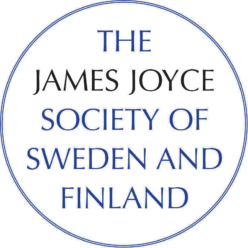A report from Glasgow with pictures
Lauri A. Niskanen
Senior Researcher, University of Turku
The James Joyce Society of Sweden and Finland Representative II for Finland


Across the Waters
XXIX International James Joyce Symposium
James Joyce lived his life in voluntary exile, and in Sweden and Finland his writing was an immigrant from across the waters. How was this literary emigrant received in the Northern shores and who mediated his oeuvre into our literary horizon?
I discussed this question in my presentation “The Finnish Evelines” on the early Finnish translations of James Joyce at the translation panel of this year’s international James Joyce symposium in Glasgow, admittedly, to mostly Scandinavian audience.

Traditionally, the translation themed panels are not widely popular among the Anglo-American Joyceans, even though Joyce’s oeuvre exists for most of the world in translation. With the next issue of James Joyce Quarterly, a special issue on translation, perhaps this will change.
The 29th international James Joyce symposium took place at the University of Glasgow 14-19 June 2024. The theme of the year was Across the Waters, focusing on the connections between Joyce and Scotland, migration, recirculation, diaspora, urbanisation, industry, and Celtic connections. The theme was reflected in plenary lectures, presentations, and panels discussing migration and diaspora, travel and ocean voyages, empire, the Scottish enlightenment, and even sport cultures. The symposium begun on Friday with a keynote from Maud Ellmann from the University of Chicago and included a presentation “Stephen’s Green” in the topographies panel from Markku Lehtimäki from the University of Turku on a fictional mind and its environments in Portrait and Ulysses.
Friday evening concluded with a drinks reception at Glasgow City Chambers, hosted by the Glasgow Lord Provost, Jacqueline McLaren.


Saturday included a panel on Joyce’s Dublin, with presentations from Terence Killeen (James Joyce Centre, Dublin) on the space of Dublin and the form of fiction in Ulysses, Ethan King (Brandeis University) on Joyce’s cloacal obsession, and Austin Briggs (Hamilton College) on “Dear Shitty Dublin”. Especially in King’s and Briggs’s presentations one’s imagination was peaked by references to “whiffy Liffey”, odour of ashpits, and sewage infrastructure, and we were reminded that in Joyce’s era, ‘ash’, ‘dirt’, and ‘shit’ were largely synonymous.
Richard Barlow’s wonderful keynote lecture looked at the interconnectedness of the Irish and Scottish literary traditions, the mythical tradition of the “materialist Saxon, the spiritual Celt”. Finally, a panel on Joyce and the arts featured David Spurr’s (Université de Genève) presentation on architecture in Finnegans Wake, Cleo Hanaway-Oakley’s (University of Bristol) presentation on “Joyce and the Art of Blindness”, and, finally, Jean-Michel Rabaté (University of Pennsylvania) speaking about Joyce’s music of the future. Rabaté has written extensively on, among other things, Joyce’s musicalized fiction in ‘Sirens’, and in Glasgow he talked about Joyce’s attempts at polyphony in literature, and the possibility of silence.
Saturday was concluded by a very special event at the Glasgow Film Theatre. We were shown a selection of rare short films from the collection of the British Film Institute from the year 1909. The entire program represented something that could have been an evening’s entertainment at the Cinema Volta, the first ever permanent cinema in Dublin, co-founded and managed by James Joyce, on which he worked “indefatigably” for less than two months, until he returned to his family in Trieste and the venture failed.

The collection of films gave a sense of the variety of genre and subject matter, from the melodramatic fiction film The Way of the Cross, to the newsreel Aviation Weeks at Rheims, to the short documentary Pêche aux Crocodiles (fishing for crocodiles). The films were presented with live musical accompaniment from Forrester Clifton Pyke.
Sunday 16 June was, of course, Bloomsday. The keynote of the day was Vincent J. Cheng from the University of Utah, lecturing on sports, politics, and Joyce. We do not, perhaps, always remember that Joyce’s texts are filled with references to sports from field hockey to hurling, and from boxing to, of course, horse racing. Sunday concluded with Bloomsday conference dinner at the Glasgow University Union.
The symposium itself concluded not without controversy. The Irish Times reports that a very influential and esteemed member of the Joycean community, the 96-year-old Swiss scholar Fritz Senn, was asked to leave the prestigious academic conference, an event which he happened to found, under complaint of sexual harassment. The complaint consisted of the senior scholar making inappropriate comments, gifting chocolate, and photographing a young woman without consent. While it is very welcome in the Joyce community in particular and in any community in general, that inappropriate and misogynistic behaviour is taken action against, it is also fair to say that many academics in the community, who know Dr Senn as an inspiration, a guide and friend, are baffled by these particular accusations against the 96-year-old, and are reminded that Fritz has photographed these events for decades, and as a Swiss is accustomed to gifting many of us chocolate on different occasions in a completely benign manner.
The Irish Times article is behind a paywall but here is an open letter about the controversy:
And here is an open letter answer to the above letter:
